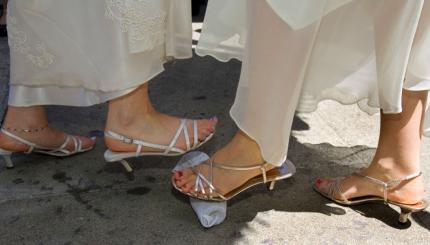Today’s post from Keshet Board member Carson Gleberman offers advice from parents of LGBTQ children. If you’re looking for more support, check out the Keshet Parent & Family Connection.
What does it mean to be a “good parent” to a child who is questioning his or her sexuality or gender, already identifies as LGBTQ, or is somewhere in between?
We intuitively know that little things like word choice and facial expressions matter, but the right actions and reactions often don’t spring readily to mind in the moment. And—no pressure!—the stakes are kinda high. This theme emerged in the very first interview I did for my website.
“Parents can make it a self-fulfilling prophecy: they think [their child’s life as a queer person] is going to be hard, so they don’t stand up for them when they could, and indeed, life becomes harder than it needed to be.”—TH
Yet, parents have their own coming out process to go through, from zero to understanding to advocate, on an extremely compressed schedule. But my interviews with teens and former teens brought welcome news: “good” parents don’t have to be perfect. Attention to some little things, even if uneven or awkwardly done, make a big difference.
1. A few small signals, or invitations to open a conversation, might seem to be ignored in the moment but will register:
“My grandfather, who was 94 when he died, used to watch James Bond movies with me. One day, out of the blue he paused the movie and asked me what I thought of gay marriage, and said he agreed with it. My grandparents had a house on Fire Island for years (I’m still mad they sold it) and he said they had partied with gay people out there. Taking time to talk and voice support makes a huge difference. Recently I was driving out to Long Island with my dad and there was news on the radio about the Iowa Caucus. They mentioned the Republican pledge to reverse gay marriage. My dad was reading, only half paying attention, but his reflexive grunt of disapproval was really wonderful.”—PO
“My mom always said, ‘You can talk to me about anything. The most important thing is to respect your body.’ She would say that sometimes to try to spark a conversation, and I got annoyed and angry at the time, but it was actually really important. I think it’s appropriate for parents to bring their questions and concerns. In a way, I would be more offended by a parent not being honest with their reactions even if it is painful or shows prejudice.”—MS
Even in an era when same-sex marriage gains ground quickly, we should not underestimate the Mount Everest-like weight and carbon dioxide-like pervasiveness of the old expectations.
“A daughter of a two-mom family living in an LGBTQ-friendly neighborhood came home from pre-school and asked one of her moms if she was sure she wasn’t really a man. And many of her classmates had gay or lesbian parents.”—TH
2. And yet, making some small changes in language, even if you forget and don’t do it every time, can add up.
“Parents can make an effort to not create a heteronormative environment, like by not asking ‘Do you have a girlfriend?’ but ‘Are you seeing someone?’”—PO
“And don’t express relief when your kid reveals an interest in someone of the opposite sex. It undermines an opening for any discussion about sexual confusion, for your own kid or someone she knows.”—KW
“I am surprised sometimes by how many people are still using the word “choice,” and thereby implying that it’s a moral defect.”—BK
3. Taking the time to listen a little deeper can show what your kid really needs.
“The after-school program at my son’s nursery school had different leaders than the day program. I didn’t realize the difference in their attitudes. My son hated after-school because they made him go outside and play soccer with the other boys, while the girls could stay inside and play pretend games. He said he hated the whole thing, and I did not probe as to why. Not until he was 18 and out, and after I had started the Spanish-speaking parent support group [at the nursery school], did we sit down with the pre-school director who wanted to improve the school’s policies around gender expression. That was a big step in the healing process for him and for me.”—LM
“You have to pay careful attention to the question that’s really being asked, which is often, ‘Having two mommies is different, but is it OK?’ [Kids] all come with a bit of baggage, even from liberal families.”—BK
In movies and on TV the dialogue may be emotionally fraught, but proceeds smoothly.
In real life, we have to write our scripts and deliver them at the same time, and the results (at my house anyway) are rarely pretty. Even when I eventually get across the point I was just realizing was the truly important one, I often feel I haven’t done it very well.
But my research shows that matters much less than we parents think.
Like this post?


